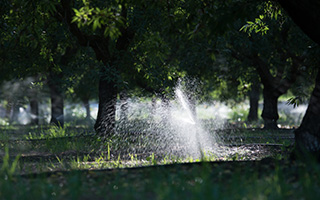Water Conservation

Water is what brings so many people to Florida. With our many lovely springs, rivers, lakes, and beaches, it’s no wonder that we have over 20 million residents with a population growth that’s double the national average. How are we supplying all these people with household water?
Currently, most household water is provided by groundwater sources. This means the water is coming from underground in the aquifer. Increased draws from the aquifer can lead to reduced spring flows and saltwater intrusion. This is why we need to keep track of how much water we are using and adjust our habits — to ensure that we will all continue to have enough water for years to come.
The Problem
Floridians in particular use a lot of water; every person uses an average of 71 gallons of water daily. Irrigation is the worst offender, with it being typically more than half the typical water bill. You can find more irrigation statistics in the UF/IFAS publication titled, “How Much Water Am I Using to Irrigate My Yard?”
As our population continues to grow, and the demand for water grows with it, we are depleting groundwater supplies, and potentially altering springs, stream flows, and lake levels.
How You Can Benefit From Conserving Water
Water conservation doesn’t just benefit the environment, it also helps your wallet. The average Florida household typically spends about $1,000 annually on water and sewer service. However, simply switching to water- and energy-efficient fixtures can save an average of $350 per year.

The financial impacts extend beyond the household level as well. Energy is a major operating cost for drinking water systems, and can be as high as 40 percent. So, reducing your use of water reduces the amount of energy used to deliver it. This translates to lower operating costs and a lower cost of water for the consumer.
The scarcity of freshwater in our state has also led to increasing reliance on brackish or saltwater treatment systems. These treatments are incredibly expensive; when Tampa Bay Water incorporated them into their water treatment plan, their energy costs rose by 138 percent. These new systems also emitted 18 times more carbon dioxide. Using less water would reduce our reliance on such treatments, lowering the price of water and reducing greenhouse gas emissions.
As we continue to rely solely on groundwater systems, increased demand requires building more infrastructure. This infrastructure is typically funded by increased water rates and local taxes. Using less water means lower taxes and water bills.
Beyond the financial benefits, water conservation can also lead to better water quality. Excessive irrigation and fertilizing leads to pollution of rivers, lakes, streams, and springs. This can both harm our drinking water supply and reduce the recreational value of Florida’s best-loved natural areas. Of course, reversing damage to natural areas is expensive as well, and the tax dollars spent on patching the problem could otherwise be used to improve communities.
Conserving Water in the Landscape
Since irrigation tends to account for over half of the average U.S. water bill, the landscape is a good place to start for water conservation. Even if you use well water or reclaimed water for irrigation, reducing your water use will further benefit the environment and will reserve water for future use.
Often the hesitation about committing to water-saving practices is concern about reduced landscape quality. Communities may have strict rules for outdoor maintenance and social norms lead to a desire for lush, vibrant landscapes. However, this is still possible even with decreased irrigation.
In fact, less irrigation can make your landscape look better. Overwatering may lead to increased disease susceptibility and thatch buildup in lawns. This causes shorter root systems and decreased tolerance against stress and drought. Water-loving weeds will also be encouraged with excessive irrigation.

Landscape water use can be lowered by as much as 70 percent by properly managing your irrigation system. The first step you can take is to check your irrigation timer and make sure you are only irrigating as needed. Then check for leaks, over-spraying, or other causes of inefficiency.
The average Florida home with a sprinkler system uses more than 1,000 gallons of water each time they water their lawn. By reducing how often you irrigate, you can reduce your overall water use. Many homeowners are able to achieve a green landscape by relying on rainfall.
The key is to give your plants only as much water as they need. For the lawn, you’ll spot these signals if it needs water:
- Leaf blades are folded in half lengthwise.
- Grass has a blue-gray hue instead of bright green.
- Lawn does not bounce back as quickly after footprints and tire tracks are made.
Microirrigation should be used as much as possible since it gives you the most precision. However, any type of irrigation will be more efficient if it is calibrated properly and set to only irrigate during a dry spell.
Giving your plants only the water they need helps you have a healthy, beautiful landscape! Landscapes can still be lovely and functional, even while cutting your water bill by 39 percent.
Visit the Florida-Friendly Landscaping™ website to see how adopting better landscaping practices has led to significant water savings in many communities.
For more on conserving water in the landscape, contact your county Extension office.
Also on Gardening Solutions
- All irrigation articles
- Florida’s Water Resources and What You Can Do to Protect Them
- How Do My Yard Care Practices Affect Our Water?
- Saving Water Using Your Irrigation System
More from UF/IFAS
- Estimating Benefits of Residential Outdoor Water Conservation: A Step-by-Step Guide
- Florida H2OSAV Insights: Home Water Use in the Gainesville Regional Utilities (GRU) Service Territory
- Residential Irrigation Water Costs in Osceola County and Orange County, Florida
- Home Irrigation and Landscape Combinations for Water Conservation in Florida
- How Much Water am I Using to Irrigate my Yard?
- Summary of UF/IFAS Turf and Landscape Irrigation Recommendations
- Watering Your Florida Lawn
